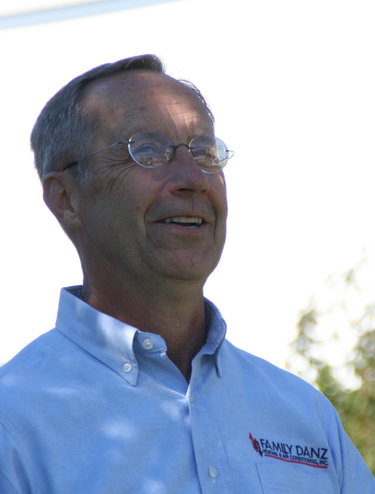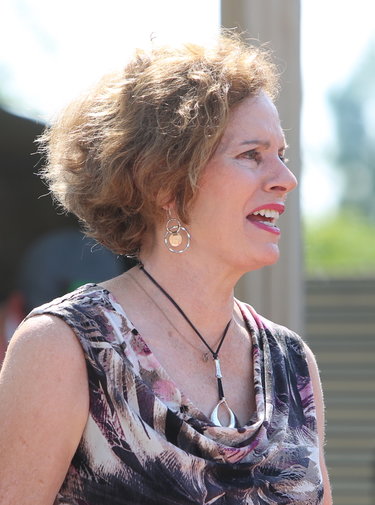State Senate District 46: Danz and Fahy vie for seat held by retiring Breslin
Republican Ted Danz says he is running for the State Senate to give voters a choice.
“As I watch the insane policies enacted as a result of the Albany establishment — and one-party rule, I’m compelled to take action,” Danz wrote this month in a letter to The Enterprise editor. “I’m running for office to try to revive our once thriving state and ensure positive opportunities are available to future generations.”
Patricia Fahy says, after 12 years in the State Assembly, she is running to amplify her voice in the senate. “You can get more done,” said Fahy of serving in the 63-member upper chamber.
In a long list of her accomplishments, Fahy singles out two: making college more affordable and a five-year effort to reimagine State Route 787.
Danz and Fahy are vying to represent District 46, a post from which Democrat Neil Breslin is retiring at the end of the year.
Danz has an uphill battle against what he calls “one-party rule” as Democrats in the district outnumber Republicans by more than 2 to 1. Both houses have Democratic majorities and the governor is a Democrat.
The 46th District, with voters from Albany, Montgomery, and Schenectady counties, has roughly 95,000 Democrats, 46,000 Republicans, 6,000 Conservatives, 1,000 members of the Working Families Party, 9,000 voters enrolled in other small parties, and 56,000 unenrolled voters.
Danz also has the Conservative line while Fahy has the Working Families line.
Danz, who lives in Guilderland and is a past chairman of the town’s Republican committee, made his first foray into politics in 2007 when he ran unsuccessfully for the Albany County Legislature. Then, in 2010, he challenged the incumbent Congressman in the 21st District, Democrat Paul Tonko.
Danz ran against Fahy before, in 2012. After John McEneny retired from representing the 109th District in the State Assembly, Fahy leapt into local politics with a grassroots campaign, besting her five opponents in the Democratic primary, with 37 percent of the vote, before easily winning her seat in the fall election against Danz.
The Enterprise invited both Fahy and Danz to participate in an online forum, which Danz declined. The point of the forum is to have candidates share their views on relevant issues so voters can see how those views line up with their own.
Enterprise readers can see, in a video posted to The Enterprise website, how Fahy responded to questions, posted at the bottom of this article, about five different issues. Her responses have been summarized in print along with an attempt to include Danz’s views based on the interviews The Enterprise conducted with him over the years as he sought various offices as well as from his October letter.
Prop 1
Fahy supports the constitutional amendment that adds to protected rights and finds it “a little sad to see how it’s become a political football.”
Although reproductive rights and trans and LBGTQ+ rights have already been codified into law, she said, making it constitutional provides further protection.
“This is really about making sure that, despite what the Supreme Court has done, despite what other states may be doing, that in New York, we respect a woman’s right to make her own decisions.”
She went on, “It certainly doesn’t change parental rights … It doesn’t change sports or anything that it’s been attributed to.”
Education
Asked about the governor’s proposal to eliminate hold-harmless in state aid to schools, Fahy said, “We have talked about the archaic way our schools are funded. So I do think that this effort is a timely and good one.”
She noted that the Rockefeller Institute of Government, investigating the proposal, is local and well-respected.
“It’s no secret, particularly in our rural areas, even some of our urban areas, we have seen population losses, so we need to right-size in a way,” Fahy said. “However, we need to do that in a way that doesn’t harm students.”
Rather than penalize districts with shrinking enrollment, Fahy said she’d like to increase funds to growing districts. “What we need to do is look at where more increases need to go,” Fahy said.
She also said that measuring wealth in a school district has been controversial as well as how a district tries to tax itself. “There are some districts that can probably do a little more for their school districts, yet others really make an effort to, but they struggle.”
Fahy went on to say that she supports the tax cap “because it’s holding the line on property taxes, which is probably the least popular tax we have in this state.”
The burden for funding belongs at the state level, Fahy said, and she is proud of an “incredible track record of putting billions upon billions into education.”
Immigration
Danz’s October letter had this to say about immigration: “Meanwhile, as our businesses and taxpayers see their dollar stretched thinner and thinner, this state has no problem funding a self-created migrant crisis paid for by those same New Yorkers to the tune of $4.3 billion — all on the dime of the taxpayer, so many of whom are struggling day-to-day to support the needs of their families.
“If elected, my commitment to you would be to end the state’s sanctuary status, provide a full and transparent accounting of taxpayer funds used for migrants, and further protect local control by clarifying that a local state of emergency supersedes one declared by the governor.”
Fahy believes the billions of dollars have been well spent.
“I’m the daughter of immigrants,” she said. “My parents came here with nothing and no education. I do know there can be expenses at the front end, especially for language services and help with finding apartments. But, in the end, I am a product of the investments made in public education.”
Fahy also said the influx of migrants to New York state has “stemmed because of the changes the Biden administration has done to stop or manage the inflow at the borders” and that federal reform is needed.
“And unfortunately Donald Trump was on record encouraging Republicans not to support federal immigration reform so it’s kept as a division issue,” she said.
At last count, Fahy said, “We still have 400 adult asylum seekers here in the city of Albany.
“Work authorizations are essential, Fahy said, “so asylum seekers can become self-sufficient while their legal cases are going through.”
Fahy noted that she lives in Albany between two hospitals, St. Peter’s and Albany Med, which have severe staffing shortages. Fahy herself was checked into a recent doctor’s visit by a Venezuelan woman who had work authorization. “For me, it was just a wonderful thing to see,” she said.
Fahy concluded that she takes the long view. “And we need the workers,” she said. “It’s no secret we’ve lost population, particularly in upstate New York.”
Fair taxes
Danz’s letter had this to say about taxes in general: “As a former small-business owner, I’ve seen firsthand the devastating effects of the Albany establishment. According to the Tax Foundation’s 2023 State Business Index, New York’s business climate ranked 49th.
“Whether it’s keeping in line with the state’s out-of-touch insane mandates, or state surcharges on business, one thing is clear — New York, once the driving force behind our nation’s prosperity, has become the enemy of the business owner.
“Yet the irony is: As a result, you, the consumer, pay more and more. It’s a literal lose-lose scenario. If elected, I am committed to reducing the regulatory burden on businesses, providing tax relief to small businesses, and ensuring tax dollars are given back to our law-abiding citizens. If we want to build a more affordable New York, it starts by cultivating a more nurturing business atmosphere.”
Fahy, responding to the specific Enterprise question about New York adopting a single, enforceable assessment standard, said of New York state, “We have the widest range of income disparity in the country. In other words, we have the hyper-wealth as well as entrenched poverty.”
She’d said she’d have to look at what other states do with single assessment standards.
Fahy noted that, in 2021, she worked with then-Senator George Amedore, a Republican, to help residents cope with the “complete upheaval” when Guilderland, “to their credit … trying to do the right thing,” underwent a townwide property revaluation.
She said of towns, like Westerlo, that don’t revalue properties regularly, “It’s unfair to the new owners coming into town.”
Albany, where Fahy lives, recently revalued properties. “It’s a lot of sticker shock when you see it,” she said, “but it also tries to equalize commercial properties versus the residential.”
Fahy went on to speak of the problems with short-term rentals, like Airbnb, whose “investment properties [are] really affecting our lakefront communities.”
Those investment properties are not paying commercial property taxes, which shorts the municipalities, she said, and has proposed legislation that would create a state registry.
Environment
“I think the state most definitely needs to proceed in mitigating climate change,” said Fahy, noting recent floods and hurricanes.
“We rarely go anywhere without hearing of what used to be called a natural disaster,” said Fahy. “We now know, and the science is telling us, there is nothing natural about these disasters … so we either pay now or we pay later.”
She also said, “We’re already beginning to see those stories of people moving back North who are tired of the trauma of living through a hurricane season or flood season.”
Fahy said she attended the recent ribbon-cutting ceremony in New Scotland, heralding the state meeting, a year early, the statutory goal of six gigawatts of distributed solar being installed across New York as set out in the Climate Leadership and Community Protection Act.
“It was a year in advance and, by the way, under budget,” said Fahy.
She then spoke of the importance of maintaining agricultural land. “We want to work with farmers … to make sure we can keep our small farms,” she said. “So there’s ways to do this such that it’s a win, win, win, win.”
Fahy went on to say nuclear power might be an option and said she’d keep an open mind.
“We just spoke to somebody this morning about farms and the dairy industry and what we can do with anaerobic digesters to capture that methane, which is terrible for the environment,” said Fahy, concluding, “so with problems comes incredible ingenuity.”
Five statewide issues for 2024
Proposition 1
This election, New Yorkers will vote an amendment to the state constitution that would strengthen abortion rights and anti-discrimination laws for women and the LGBTQ+ community:
The constitution currently states that no person shall be denied equal protection of the laws because of race, color, creed, or religion. The proposed amendment would add to that list: ethnicity, national origin, age, disability, or sex, including sexual orientation, gender identity, gender expression, pregnancy, pregnancy outcomes, and reproductive healthcare and autonomy.
Do you support this amendment? Why or why not?
Education
During last year’s state budget process, Governor Kathy Hochul proposed eliminating the hold-harmless provision when distributing state aid to schools. The provision allows districts with declining enrollment to keep the same funding as in the previous year. Teachers’ unions and others objected, and the matter is now being considered by the Rockefeller Institute of Government ahead of next year’s budget.
How should state aid to schools be allocated?
Immigration
Close to 300,000 migrants have arrived in the state since spring 2022, and more than 65,600 people remain in New York City. Up to 1,500 migrants live in temporary emergency shelter outside the city. Last year, the state allocated $25 million to a Migrant Relocation Assistance Program overseen by the state Office of Temporary and Disability Assistance. Several hundred migrant families have been relocated outside New York City under the MRAP program. The state allocated about $4 billion in the last two budgets to help New York City shoulder the cost of housing, medical and other essential services for the newcomers.
What should the state be doing going forward to handle the influx of migrants?
Fair taxes
The State Office of Real Property Tax Service has to deal with 1,000 jurisdictions, each one setting their own assessment standard, and so relies on sampling and trends which can often go awry. Towns like Westerlo have not revalued properties for decades. So the state-set equalization rate for the town is less than 1 percent of full market value.
This leaves newcomers with an unfair tax burden and effects, even places like, say, Guilderland, which went through revaluation in 2018. The school district had to pay so much in tax certiorari challenges where businesses and residents were owed taxes that it used up all of its reserves and had to take out a bond. Since the 2020-21 school year, as a result of the certiorari challenges, the property value in the Guilderland school district has decreased from $4.4 billion to $4.2 billion this year, shifting the tax burden to the neighboring towns of Bethlehem, Knox, and New Scotland.
Also, there’s no enforcement mechanism to make towns with badly skewed assessment rates comply.
Should New York follow the lead of most states and have a single assessment standard? Why or why not?
Environment
In 2022, New Yorkers overwhelmingly approved a ballot proposition to make $4.2 billion available for environmental projects, and state leaders often tout New York’s “nation-leading” climate goals. However, the state is now struggling to meet the goals set by the 2019 Climate Leadership and Community Protection Act and has not met several important deadlines. By Jan 1, for example, regulations were to have been set to force polluters to comply. It now looks unlikely that the CLCPA mandate of having zero-emissions electricity by 2040 will be achieved.
Should the state proceed in mitigating climate change and how?




